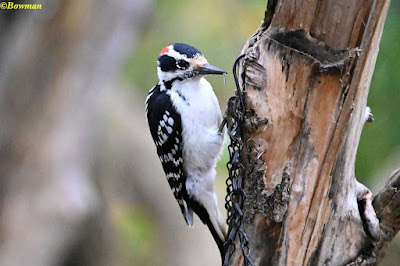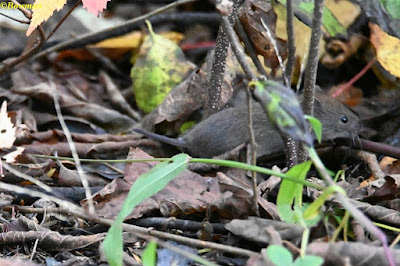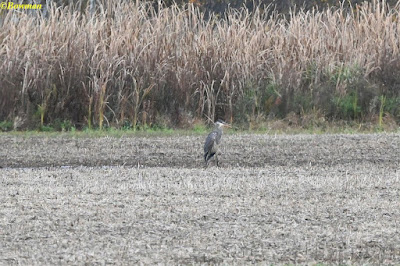October 26, 2023
Birding Report by Jane Burgess
Eleanor and I met at Elmvale Acres
Shopping Centre at 8:00 and proceeded to Dolman Ridge. On the Ridge
Road we saw a small flock of Wild Turkeys. We usually drive very slowly
down Dolman Ridge Road, we did not get very far when we heard bird song
-- turned out we found a medium sized flock of American Robins. Then
Eleanor heard Golden-crowned Kinglet singing, we never did see it, but
we did try hard to find it. A lady was filling up all the bird feeders
at the Dewberry Trail. She told us, she had a helper cut down some
trees in the forest where she had put up more feeders thus allowing the
birds to be undisturbed while eating. We saw Blue Jays, it is amazing
how they know when someone throws peanuts on the ground, they fly in and
gobbling the nuts up. There were White-breast Nuthatches, Hairy
Woodpeckers, White-throated Sparrows, Dark-eyed Juncos, Mourning Doves
and I think two Fox Sparrows.
Eleanor checked
her phone and said Bill called. He told me he would call, yes and I
left my phone in the vehicle. He told us that he would join us at Mer
Bleue Bog. We walked down the Dolman Road, the trail part, in hopes we
might be lucky and see a Yellow-billed Cuckoo that had been reported
there over the past several days. We played the song, but it was not to
be, no Yellow-billed Cuckoo.
We met up with
Bill at Mer Bleue Boardwalk. More bird feeders have been put up, by the
same lady who fills the feeder at Dewberry Trail. We had the same
species of birds we had seen at the Dewberry feeders. We had a little
visitor, a tailless mouse, well I thought it was tailless, until I saw
Bill's photos - a House Mouse. When we were leaving I noticed a
painter, I went over to speak with him. My mother was a painter and I
have always been curious how artists paint. This fellow had done three
pencil sketches, one for depth, one for contrast and I can't remember
the third. He said it would take him about 1 1/2 to 2 hours to paint
(in oils) to complete the painting, then because he was using oil
paints, it would take up to 2 days to dry. He had done some stuff to
the wood he was painting on and he said it helps the oils dry more
quickly. I asked if he shows his work, yep in the next week or so he
will be showing his paintings at the Blackburn library. I apologized to
Eleanor and Bill for taking so long, I said I was sorry and yet I was
not sorry, I quite enjoyed the conversation with him.
Off
to Farmer's Way where we saw a flock of four birds flying ahead of us,
they would light then fly, again and again, finally we got to see one of
them -- Chipping Sparrow. In the same general area we head a Song
Sparrow.
On Perrault Road we stopped because we
saw something strange, not a bird, but we wondered what it was. Eleanor
brought out her scope and after locating it, told us it was just a big
rock. While she was checking out the rock I was looking at the
beehives. I guess all the bees are in the hives now. I checked it on
the internet and it indicated bees retreat to their hives when the
temperatures drop below 10 degrees Celius. They then form a winter
cluster to keep warm--sort of like a giant three-month slumber party.
The poor bees must be confused with the weather we have had in September
and October.
I think it was on McFadden Road,
two or three Sandhill Cranes were spotted, far away. I have to say I
couldn't get excited about 2 or 3 Sandhill Cranes when we saw the large
numbers of them in the Cobden area.
We stopped at a ploughed field near Giroux Pond, we could hear Horned Larks but we could not see them.
At
Giroux pond (north), we thought at a quick glance there was nothing on
the pond, but when we used our binoculars, there were lots of birds --
Lesser Scaup, Common Goldeneye, Hooded Merganser, Ruddy Duck, Mallard,
Green-winged Teal, Ring-billed Gull and Canada Geese. On the other side
of the road, we heard and saw a small flock of Great Yellowlegs. While
I was walking toward the water, I frightened a Sharp-shinned Hawk. On
the water there were 4 Common Mergansers.
What
should we do, go to the lagoons or go look for Snow Geese around
Casselman? We opted for the Snow Geese scenario. While driving by the
Lafleche Dump on the 417, we saw a huge flock of white birds, could we
be so lucky? Well we set up our scopes on Lafleche Road and no not Snow
Geese, but a whole lot of Ring-billed Gulls, with a few Great
Black-backed Gulls sprinkled in. Where should we go here Moose Creek or
over the 417? Off to Moose Creek, we had to stand on the car to see
over to the lagoon, yeah a couple of Canada Geese. Back we went and
over 417 to Concession 21. I was telling Eleanor we often see corn
spilled on the road, and sure enough there was a spill at the corner.
We saw a mixed flock of Horned Larks and American Pipits. We drove up
Renaud Road, where we scared up a rather large flock of Horned Larks. I
was looking at Facebook and Tony Beck had a large flock of Snow Geese
at Casselman on the day we were there, he did not indicate when or where
he saw them. But indicated he was disappointed in not seeing them, he
figures it is one of two reasons, avian flu or the weather. I hope it
is the weather.
We then checked out the lagoon
near Ste Isidore. There is a farm at the end of the road that had
Helmeted Guinea Fowls with chicks and some domestic Muscovy Ducks.
Walking to the lagoon, a 3rd year Bald Eagle was spotted in a far off
tree. How did we know it was a 3rd year? It had a very dark eyestripe
and of course a huge beak. Eleanor spotted 2 American Coot. There were
so many Green-wing Teal on the shore causing us a bit of confusion
because of their pale bellies, that of course we never see because we
see them swimming. After taking some photos, Bill said we have at
least one Ring-necked Duck, thank goodness for photography. We also had
a fly by of 3 Greater Yellowlegs
Driving home,
we had to wait for five minutes or so on one of the country roads,
while a farmer emptied his corn harvester into a big wagon. When he
backed up, we thought oh no, he might hit us with the unloading spout.
But no as the farmer was moving the harvester the spout moved back into
position beside the drum of the harvester.
A Red-tailed Hawk was spotted on the 417, something that does not often happen.
For
late in October, getting 42 species is pretty good and seeing the small
flock of Greater Yellowlegs was really good. How did we know they were
Greater and not Lesser because they did their tututu call while Lesser
does a too-too call.
Species Seen
- Wild Turkey
- Canada Goose
- American Robin
- Golden-crowned Kinglet
- Blue Jay
- Hairy Woodpecker
- White-breasted Nuthatch
- Black-capped Chickadee
- Mourning Dove
- Dark-eyed Junco
- Fox Sparrow
- White-throated Sparrow
- White-crowned Sparrow
- Red--winged Blackbird
- American Crow
- Common Raven
- Rock Pigeon
- Great-blue Heron
- Chipping Sparrow
- Song Sparrow
- European Starling
- Sandhill Crane
- Lesser Scaup
- Common Goldeneye
- Hooded Merganser
- Ruddy Duck
- Mallard
- Green-winged Teal
- Ring-billed Gull
- Common Merganser
- Greater Yellowlegs
- Sharp-shinned Hawk
- House Sparrow
- Turkey Vulture
- Great Black-backed Gull
- Horned Larks
- American Pipit
- Bald Eagle
- American Coot
- Northern Harrier
- Ring-necked Duck
- Red-tailed Hawk




















No comments:
Post a Comment